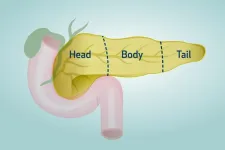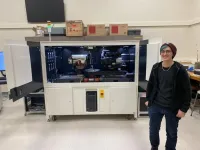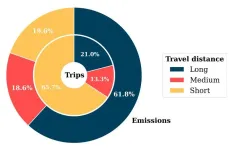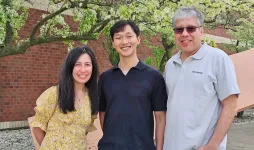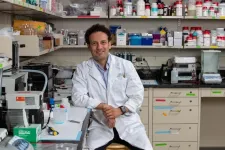(Press-News.org) Illumina, a global genomics and human health company, has partnered with the Garvan Institute of Medical Research’s TenK10K project to help transform the treatment of complex diseases, starting with autoimmune diseases, with a joint investment of $27 million AUD.
The Garvan Institute plans to map 50 million human cells from 10,000 people to identify unique genomic fingerprints of autoimmune diseases, heart diseases and cancer, building on the early success of a clinical trial for Crohn’s disease.
Crohn’s disease affects more than 80,000 Australians. As with many autoimmune diseases, predicting which treatments will work best for which patients is currently impossible. The OneK1K clinical trial across 10 Sydney hospitals shows that a genetic fingerprint project led by the Garvan Institute can help match individual patients with the most effective treatment.
Illumina is supporting the project with supplies, equipment and specialist research support, which will provide a critical boost for Garvan’s single-cell and whole genome sequencing research and enable upscaling to make the TenK10K project the largest project of its kind. The investment will enable the Garvan Institute to improve how accurately disease-linked immune cell fingerprints can be identified and develop:
Commercial tests to identify the right therapy for challenging autoimmune diseases including multiple sclerosis, rheumatoid arthritis, lupus, type 1 diabetes, spondylitis, inflammatory bowel disease, and Crohn’s disease
Early trials of powerful new RNA therapies
Potential early targets for treatments for cancers and long COVID
Tests to track the aftermath of heart attacks and identify risk of sudden death.
“This work has the potential to enable a significant step forward in personalised medicine. In 2022, in a paper in Science, we announced that we had analysed the genomic profile of more than one million cells from 1,000 people to identify markers of autoimmune disease,” says Professor Joseph Powell, leader of the OneK1K and now TenK10K project at the Garvan Institute of Medical Research. “We were able to do this using single-cell sequencing, a new technology that allows us to detect subtle changes in individual cells,” he says.
“That led to a proof-of-principle clinical trial at 10 Sydney hospitals to see if we can improve the treatment of Crohn’s disease. The early results suggest we can predict a patient’s response to a therapy based on their genetic profile. Through single-cell sequencing, which analyses individual cells rather than an average of many cells, we can see fingerprints that we’ve never been able to distinguish before.”
“Now, with the help of Illumina, TenK10K will build on this work to generate single-cell data on around 50 million cells from 10,000 individuals to further improve the accuracy of predicting disease risk and treatment response. This research will help identify the subtle genomic differences in everyone’s cells, which will help us speed up diagnosis and treatment for many diseases. We are excited by translational opportunities that come from combining this globally leading biotechnology resource with advanced machine learning methods,” says Professor Powell.
NSW Minister for Medical Research David Harris congratulated Garvan Institute of Medical Research and Illumina on this unique partnership.
“This partnership will help advance the field of genomics and personalised medicine, delivering benefits to patients across NSW,” Mr Harris said.
“The future of this work will allow for next-generation sequencing of patients’ genomic data to ensure they receive more personalised treatment for chronic and autoimmune conditions.
“NSW has a strong history of investing in ground-breaking genomic research. New collaborative partnerships such as these are vital to ensure NSW continues to be a world leader in delivering cutting-edge and truly translational research that will help meet the challenges and needs of future health care delivery.”
“In 2007 at age 11 I was diagnosed with ulcerative colitis,” says Madeleine Jandura.
“Over the next twelve years I had to deal with countless doctors and specialist visits, blood tests, scans, colonoscopies, emergency visits, long hospital stays, and countless ever changing oral and intravenous medications. After exhausting all options with medications, I spent the next five years undergoing four major surgeries.”
“Now I am finally rid of this disease, though I will have to deal with the impacts of it for the rest of my life and the possibility it may return.”
“I am excited to hear now how Joseph and his team are working to get faster answers and faster treatments,” she says.
Professor Benjamin Kile, Executive Director of the Garvan Institute says: “This partnership is a testament to the world-leading research happening at Garvan, leveraging our unique expertise across clinical and research fronts. This innovative research is set to transform patient care for some of the most difficult-to-treat diseases.”
“A few years ago, this project would have been impossible,” says Illumina’s Simon Giuliano, commercial lead for Oceania. “Now we have the technology to rapidly and cheaply detect the difference in the genomics of individual cells using next-generation sequencing. And that opens up the potential of a new era of personalised health, where the variation in every human cell flags the right treatment for an individual’s disease, avoiding the trial and error in the past.”
END
$27 million to map 50 million human cells and uncover genetic fingerprints of disease
Embargo and media call: 10 am, Garvan Institute, 384 Victoria St, Darlinghurst NSW
2024-05-01
ELSE PRESS RELEASES FROM THIS DATE:
Validated rules help prevent overuse of CT scans for diagnosing traumatic head and abdominal injuries in kids
2024-05-01
Head and abdominal trauma is a leading cause of death for children. About 1%–2% of children who come to emergency departments with head or abdominal injuries require immediate intervention. These injuries are diagnosed the world over by computed tomography (CT) scans. But CT-related radiation can cause cancers later in life, and accumulated evidence suggests that CT is overused.
“There is an urgent need for validated guidelines for the safe use of CT to diagnose injured children while preventing unnecessary radiation exposure,” says Pradip Chaudhari, MD, Director of Research and Scholarship, Division of Emergency and Transport Medicine, ...
Closing the U.S./Mexico border during COVID-19 increased HIV transmission
2024-05-01
The border crossing separating San Diego, California, from Tijuana, Mexico, is a dynamic place. When it was closed during the COVID-19 pandemic, drug tourism from San Diego to Tijuana continued. This provided a flow of people in both directions, bringing with them not only the virus that causes COVID-19 (SARS-CoV2) but also the virus that causes AIDS (HIV). A collaborative study led by researchers from University of California San Diego and Irvine, recently published in the Lancet, found that rather than preventing the spread of disease, closing the border actually increased the rate of HIV transmission.
Injection drug use increases the risk of HIV infection through ...
Researchers at Houston Methodist find difference in pancreatic cancer cells, offering new hope for immunotherapy effectiveness
2024-05-01
A new study has found that pancreatic cancer cells are different based on their location in the pancreas, providing new information about tumors that could lead to better targeted treatments.
Pancreatic ductal adenocarcinoma (PDAC) is an aggressive cancer, and the diagnosis has dramatically increased over the last decade. It is currently the seventh leading cause of cancer deaths in men and women globally and projected to be the third leading cause of cancer-related deaths world-wide by 2030. This increase is due to several factors such as an increase in obesity and diabetes.
Houston Methodist’s ...
Withdrawal of stop-smoking pill could lead to thousands of avoidable deaths
2024-05-01
The disruption to the supply of a prescription medicine that helps people stop smoking may have led to thousands fewer people quitting each year in England, which will lead to avoidable deaths in future, suggests a new study led by UCL (University College London) researchers.
Varenicline (also known as Champix) is one of the most effective treatments to help smokers quit. It works by reducing cravings for nicotine and easing withdrawal symptoms. But its distribution was paused in July 2021 in the UK and Europe as a precaution after higher than expected levels of a potentially ...
CT-ing is believing: Zeiss Xradia 630 Versa micro-CT scanner supports materials, life sciences research
2024-05-01
Interdisciplinary researchers in Illinois, the U.S. and around the world can advance their projects with the Beckman Institute for Advanced Science and Technology's new Zeiss Xradia 630 Versa micro-CT scanner, the first of its kind with life science applications in the U.S.
Computed tomography, or CT, is an imaging technique that involves capturing a series of cross-sectional X-ray scans of an object or sample — be it a material like concrete or a biological sample like an insect or human body. Stacked on top of one another, the images non-invasively reconstruct the subject in 3D from the inside out. Microscopic computed tomography, or micro-CT, helps researchers reconstruct ...
Breakthrough in complex pain management
2024-05-01
Complex Regional Pain Syndrome (CRPS) is a chronic and debilitating pain disorder, typically considered lifelong with limited treatment options. Now, groundbreaking research finds that early detection and effective treatment can lead to significant recovery within 18 months, offering hope to millions of people worldwide.
Led by NeuRA’s Centre for Pain IMPACT and conducted in partnership with the University of South Australia, the findings could deliver life-changing outcomes for people with CRPS, with up to 80% of patients recovering ...
Astronomers share climate-friendly meeting solutions
2024-04-30
Carbon emissions associated with air travel to professional conferences make up a sizable fraction of the emissions produced by researchers in academia. Andrea Gokus, a McDonnell Center postdoctoral fellow in the Department of Physics in Arts & Sciences at Washington University in St. Louis, is advocating for a reduction of these emissions.
In a paper published in PNAS Nexus, Gokus and collaborators estimated the CO2-equivalent emissions for conference travel to all 362 open meetings in the field of astronomy in 2019.
The total is an estimated ...
Missing link in species conservation: Pharmacists, chemists could turn tide on plant, animal extinction
2024-04-30
As the world faces the loss of a staggering number of species of animals and plants to endangerment and extinction, one University of Michigan scientist has an urgent message: Chemists and pharmacists should be key players in species conservation efforts.
"Medicinal chemistry expertise is desperately needed on the frontlines of extinction," said Timothy Cernak, assistant professor of medicinal chemistry at the U-M College of Pharmacy. "Animals are dying at staggering rates, but they don't have to. Modern ...
Illinois researchers develop an AI model to reduce uncertainty in evapotranspiration prediction
2024-04-30
URBANA, Ill. – When scientists look at the Earth’s available water for ecosystem services, they don’t just look at precipitation. They must also account for water moving from the ground to the atmosphere, a process known as evapotranspiration (ET). ET includes evaporation from soil and open water pools such as lakes, rivers, and ponds, as well as transpiration from plant leaves. The difference between precipitation and ET indicates the water balance available for societal needs, including agricultural and industrial production. However, measuring ET is challenging. A new study from the University of Illinois Urbana-Champaign ...
Is it time to retire the best-before date?
2024-04-30
The inventors of a suite of tests that enable food packages to signal if their contents are contaminated are working to bring producers and regulators together to get their inventions into commercial products, with the goal of preventing illness and reducing food waste.
Though the tests would cost just a few cents per package, food producers are reluctant to add costs that consumers will ultimately have to bear, say the McMaster researchers behind an article published today in the journal Nature Reviews Bioengineering.
A system based on smart packaging, the researchers say, would save producers ...
LAST 30 PRESS RELEASES:
Globe-trotting ancient ‘sea-salamander’ fossils rediscovered from Australia’s dawn of the Age of Dinosaurs
Roadmap for Europe’s biodiversity monitoring system
Novel camel antimicrobial peptides show promise against drug-resistant bacteria
Scientists discover why we know when to stop scratching an itch
A hidden reason inner ear cells die – and what it means for preventing hearing loss
Researchers discover how tuberculosis bacteria use a “stealth” mechanism to evade the immune system
New microscopy technique lets scientists see cells in unprecedented detail and color
Sometimes less is more: Scientists rethink how to pack medicine into tiny delivery capsules
Scientists build low-cost microscope to study living cells in zero gravity
The Biophysical Journal names Denis V. Titov the 2025 Paper of the Year-Early Career Investigator awardee
Scientists show how your body senses cold—and why menthol feels cool
Scientists deliver new molecule for getting DNA into cells
Study reveals insights about brain regions linked to OCD, informing potential treatments
Does ocean saltiness influence El Niño?
2026 Young Investigators: ONR celebrates new talent tackling warfighter challenges
Genetics help explain who gets the ‘telltale tingle’ from music, art and literature
Many Americans misunderstand medical aid in dying laws
Researchers publish landmark infectious disease study in ‘Science’
New NSF award supports innovative role-playing game approach to strengthening research security in academia
Kumar named to ACMA Emerging Leaders Program for 2026
AI language models could transform aquatic environmental risk assessment
New isotope tools reveal hidden pathways reshaping the global nitrogen cycle
Study reveals how antibiotic structure controls removal from water using biochar
Why chronic pain lasts longer in women: Immune cells offer clues
Toxic exposure creates epigenetic disease risk over 20 generations
More time spent on social media linked to steroid use intentions among boys and men
New study suggests a “kick it while it’s down” approach to cancer treatment could improve cure rates
Milken Institute, Ann Theodore Foundation launch new grant to support clinical trial for potential sarcoidosis treatment
New strategies boost effectiveness of CAR-NK therapy against cancer
Study: Adolescent cannabis use linked to doubling risk of psychotic and bipolar disorders
[Press-News.org] $27 million to map 50 million human cells and uncover genetic fingerprints of diseaseEmbargo and media call: 10 am, Garvan Institute, 384 Victoria St, Darlinghurst NSW

